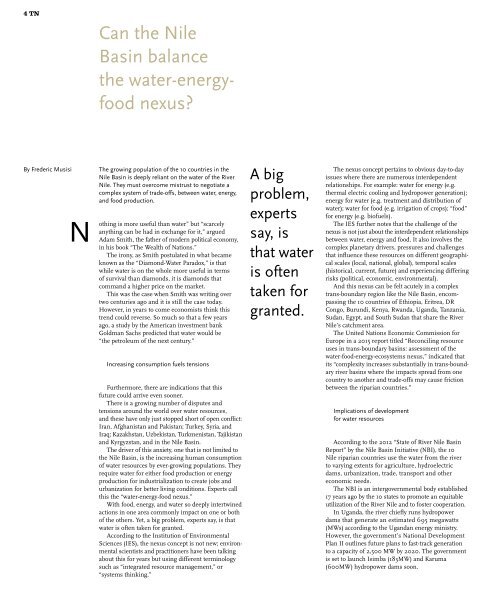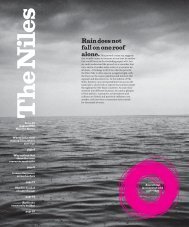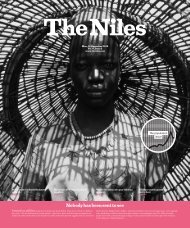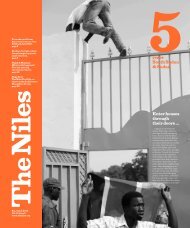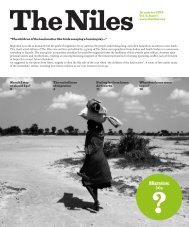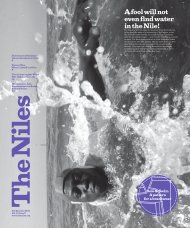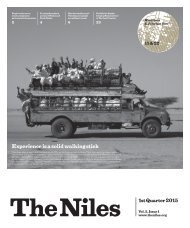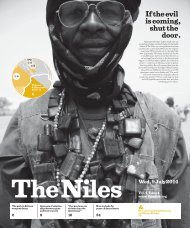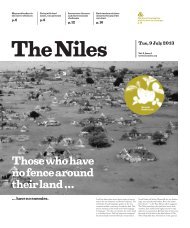You think of water when the well is empty...
Although we strive to be prepared, sometimes we can be caught unawares. That is why it’s worth thinking about water before the well goes dry in order to have enough time to plan ahead. Part of this preparation is knowing what the right questions are and striving to answer them. To be prepared and plan ahead also means to notice small changes when they occur. This can only happen if you spend time observing and learning. The Nile shows us its many facets depending on the light, the time of day and the mood of the observer. Noticing these changes helps us to know more and be prepared. Through the pages of this paper, correspondents from the Nile Basin countries share their experiences and observations about the Nile and try to find answers to the most relevant questions about the river. We celebrate the day of the Nile by thinking about water, before the well goes dry.
Although we strive to be prepared, sometimes we can be caught unawares. That is why it’s worth thinking about water before the well goes dry in order to have enough time to plan ahead. Part of this preparation is knowing what the right questions are and striving to answer them.
To be prepared and plan ahead also means to notice small changes when they occur. This can only happen if you spend time observing and learning. The Nile shows us its many facets depending on the light, the time of day and the mood of the observer. Noticing these changes helps us to know more and be prepared.
Through the pages of this paper, correspondents from the Nile Basin countries share their experiences and observations about the Nile and try to find answers to the most relevant questions about the river. We celebrate the day of the Nile by thinking about water, before the well goes dry.
Create successful ePaper yourself
Turn your PDF publications into a flip-book with our unique Google optimized e-Paper software.
4 TN TN 5<br />
Can <strong>the</strong> Nile<br />
Basin balance<br />
<strong>the</strong> <strong>water</strong>-energyfood<br />
nexus?<br />
Can <strong>the</strong> Nile Basin survive<br />
<strong>the</strong> <strong>water</strong>-energy-food nexus?<br />
By Frederic Mus<strong>is</strong>i<br />
N<br />
The growing population <strong>of</strong> <strong>the</strong> 10 countries in <strong>the</strong><br />
Nile Basin <strong>is</strong> deeply reliant on <strong>the</strong> <strong>water</strong> <strong>of</strong> <strong>the</strong> River<br />
Nile. They must overcome m<strong>is</strong>trust to negotiate a<br />
complex system <strong>of</strong> trade-<strong>of</strong>fs, between <strong>water</strong>, energy,<br />
and food production.<br />
othing <strong>is</strong> more useful than <strong>water</strong>” but “scarcely<br />
anything can be had in exchange for it,” argued<br />
Adam Smith, <strong>the</strong> fa<strong>the</strong>r <strong>of</strong> modern political economy,<br />
in h<strong>is</strong> book “The Wealth <strong>of</strong> Nations.”<br />
The irony, as Smith postulated in what became<br />
known as <strong>the</strong> “Diamond-Water Paradox,” <strong>is</strong> that<br />
while <strong>water</strong> <strong>is</strong> on <strong>the</strong> whole more useful in terms<br />
<strong>of</strong> survival than diamonds, it <strong>is</strong> diamonds that<br />
command a higher price on <strong>the</strong> market.<br />
Th<strong>is</strong> was <strong>the</strong> case <strong>when</strong> Smith was writing over<br />
two centuries ago and it <strong>is</strong> still <strong>the</strong> case today.<br />
However, in years to come econom<strong>is</strong>ts <strong>think</strong> th<strong>is</strong><br />
trend could reverse. So much so that a few years<br />
ago, a study by <strong>the</strong> American investment bank<br />
Goldman Sachs predicted that <strong>water</strong> would be<br />
“<strong>the</strong> petroleum <strong>of</strong> <strong>the</strong> next century.”<br />
Increasing consumption fuels tensions<br />
Fur<strong>the</strong>rmore, <strong>the</strong>re are indications that th<strong>is</strong><br />
future could arrive even sooner.<br />
There <strong>is</strong> a growing number <strong>of</strong> d<strong>is</strong>putes and<br />
tensions around <strong>the</strong> world over <strong>water</strong> resources,<br />
and <strong>the</strong>se have only just stopped short <strong>of</strong> open conflict:<br />
Iran, Afghan<strong>is</strong>tan and Pak<strong>is</strong>tan; Turkey, Syria, and<br />
Iraq; Kazakhstan, Uzbek<strong>is</strong>tan, Turkmen<strong>is</strong>tan, Tajik<strong>is</strong>tan<br />
and Kyrgyzstan, and in <strong>the</strong> Nile Basin.<br />
The driver <strong>of</strong> th<strong>is</strong> anxiety, one that <strong>is</strong> not limited to<br />
<strong>the</strong> Nile Basin, <strong>is</strong> <strong>the</strong> increasing human consumption<br />
<strong>of</strong> <strong>water</strong> resources by ever-growing populations. They<br />
require <strong>water</strong> for ei<strong>the</strong>r food production or energy<br />
production for industrialization to create jobs and<br />
urbanization for better living conditions. Experts call<br />
th<strong>is</strong> <strong>the</strong> “<strong>water</strong>-energy-food nexus.”<br />
With food, energy, and <strong>water</strong> so deeply intertwined<br />
actions in one area commonly impact on one or both<br />
<strong>of</strong> <strong>the</strong> o<strong>the</strong>rs. Yet, a big problem, experts say, <strong>is</strong> that<br />
<strong>water</strong> <strong>is</strong> <strong>of</strong>ten taken for granted.<br />
According to <strong>the</strong> Institution <strong>of</strong> Environmental<br />
Sciences (IES), <strong>the</strong> nexus concept <strong>is</strong> not new; environmental<br />
scient<strong>is</strong>ts and practitioners have been talking<br />
about th<strong>is</strong> for years but using different terminology<br />
such as “integrated resource management,” or<br />
“systems <strong>think</strong>ing.”<br />
A big<br />
problem,<br />
experts<br />
say, <strong>is</strong><br />
that <strong>water</strong><br />
<strong>is</strong> <strong>of</strong>ten<br />
taken for<br />
granted.<br />
The nexus concept pertains to obvious day-to-day<br />
<strong>is</strong>sues where <strong>the</strong>re are numerous interdependent<br />
relationships. For example: <strong>water</strong> for energy (e.g.<br />
<strong>the</strong>rmal electric cooling and hydropower generation);<br />
energy for <strong>water</strong> (e.g. treatment and d<strong>is</strong>tribution <strong>of</strong><br />
<strong>water</strong>); <strong>water</strong> for food (e.g. irrigation <strong>of</strong> crops); “food”<br />
for energy (e.g. bi<strong>of</strong>uels).<br />
The IES fur<strong>the</strong>r notes that <strong>the</strong> challenge <strong>of</strong> <strong>the</strong><br />
nexus <strong>is</strong> not just about <strong>the</strong> interdependent relationships<br />
between <strong>water</strong>, energy and food. It also involves <strong>the</strong><br />
complex planetary drivers, pressures and challenges<br />
that influence <strong>the</strong>se resources on different geographical<br />
scales (local, national, global), temporal scales<br />
(h<strong>is</strong>torical, current, future) and experiencing differing<br />
r<strong>is</strong>ks (political, economic, environmental).<br />
And th<strong>is</strong> nexus can be felt acutely in a complex<br />
trans-boundary region like <strong>the</strong> Nile Basin, encompassing<br />
<strong>the</strong> 10 countries <strong>of</strong> Ethiopia, Eritrea, DR<br />
Congo, Burundi, Kenya, Rwanda, Uganda, Tanzania,<br />
Sudan, Egypt, and South Sudan that share <strong>the</strong> River<br />
Nile’s catchment area.<br />
The United Nations Economic Comm<strong>is</strong>sion for<br />
Europe in a 2015 report titled “Reconciling resource<br />
uses in trans-boundary basins: assessment <strong>of</strong> <strong>the</strong><br />
<strong>water</strong>-food-energy-ecosystems nexus,” indicated that<br />
its “complexity increases substantially in trans-boundary<br />
river basins where <strong>the</strong> impacts spread from one<br />
country to ano<strong>the</strong>r and trade-<strong>of</strong>fs may cause friction<br />
between <strong>the</strong> riparian countries.”<br />
Implications <strong>of</strong> development<br />
for <strong>water</strong> resources<br />
According to <strong>the</strong> 2012 “State <strong>of</strong> River Nile Basin<br />
Report” by <strong>the</strong> Nile Basin Initiative (NBI), <strong>the</strong> 10<br />
Nile riparian countries use <strong>the</strong> <strong>water</strong> from <strong>the</strong> river<br />
to varying extents for agriculture, hydroelectric<br />
dams, urbanization, trade, transport and o<strong>the</strong>r<br />
economic needs.<br />
The NBI <strong>is</strong> an intergovernmental body establ<strong>is</strong>hed<br />
17 years ago by <strong>the</strong> 10 states to promote an equitable<br />
utilization <strong>of</strong> <strong>the</strong> River Nile and to foster cooperation.<br />
In Uganda, <strong>the</strong> river chiefly runs hydropower<br />
dams that generate an estimated 695 megawatts<br />
(MWs) according to <strong>the</strong> Ugandan energy min<strong>is</strong>try.<br />
However, <strong>the</strong> government’s National Development<br />
Plan II outlines future plans to fast-track generation<br />
to a capacity <strong>of</strong> 2,500 MW by 2020. The government<br />
<strong>is</strong> set to launch Isimba (183MW) and Karuma<br />
(600MW) hydropower dams soon.<br />
Building<br />
more<br />
dams will<br />
increase<br />
<strong>the</strong> supply<br />
<strong>of</strong> cheap<br />
electricity<br />
and help<br />
to attract<br />
investors.<br />
The Ugandan government set itself an ambitious<br />
target <strong>of</strong> turning <strong>the</strong> country, which <strong>is</strong> recovering<br />
from civil war, into a middle-income economy by<br />
2020, although th<strong>is</strong> has now been rev<strong>is</strong>ed to 2030.<br />
(A middle-income economy <strong>is</strong> defined by <strong>the</strong> World<br />
Bank as one where <strong>the</strong> annual per-capita gross<br />
national income ranges between $1,025 and $12,615.)<br />
Policymakers are now faced with a choice <strong>of</strong> pushing<br />
ahead with industrialization or opting for modernizing<br />
agriculture. Ei<strong>the</strong>r option has huge implications<br />
for <strong>water</strong> resources.<br />
Ugandan President Yoweri Museveni, who<br />
last year attempted to mediate between Egypt and<br />
Ethiopia in <strong>the</strong>ir long-standing feud over sharing<br />
<strong>water</strong> resources, argues that building more dams<br />
will increase <strong>the</strong> supply <strong>of</strong> cheap electricity and help<br />
to attract investors. Th<strong>is</strong>, he argues, <strong>is</strong> <strong>the</strong> only way<br />
to save <strong>the</strong> River Nile.<br />
“The biggest danger <strong>of</strong> <strong>the</strong> Nile <strong>is</strong> damaging <strong>water</strong><br />
in <strong>the</strong> tropics by <strong>the</strong> people. They cut trees for firewood<br />
that would help modify rainfall and end up<br />
damaging <strong>the</strong> eco system,” President Museveni said<br />
last March at a joint conference with Ethiopia’s Prime<br />
Min<strong>is</strong>ter Hailemariam Desalegn.<br />
While Museveni advocates for more dams to<br />
increase <strong>the</strong> availability <strong>of</strong> cheap electricity, o<strong>the</strong>r<br />
countries do not share h<strong>is</strong> view. For example, Egypt<br />
wants to limit large hydropower projects on <strong>the</strong><br />
river, which <strong>is</strong> its principal source <strong>of</strong> fresh <strong>water</strong><br />
and <strong>is</strong> used for food production to cater for <strong>the</strong><br />
country’s growing population.<br />
Irrigated agriculture in Egypt and Sudan, according<br />
to <strong>the</strong> NBI report, represents <strong>the</strong> single most<br />
important <strong>water</strong> usage with a combined acreage<br />
<strong>of</strong> 4.5 million hectares compared to less than 50,000<br />
hectares in <strong>the</strong> o<strong>the</strong>r Nile Basin countries.<br />
Growing <strong>water</strong> stress<br />
Ethiopia’s population <strong>of</strong> 106 million <strong>is</strong> <strong>the</strong> highest<br />
in <strong>the</strong> basin closely followed by Egypt, with 99<br />
million, and DR Congo with 83 million, according<br />
to <strong>the</strong> latest United Nations estimates. The same<br />
estimates indicate that Uganda has a population<br />
<strong>of</strong> 44 million, South Sudan and Rwanda have 13<br />
million respectively, Sudan’s population <strong>is</strong> 41 million<br />
and Burundi’s <strong>is</strong> 11 million. Kenya has a population<br />
<strong>of</strong> 50 million people and Tanzania’s <strong>is</strong> 58 million.<br />
Is <strong>the</strong>re enough <strong>water</strong> for th<strong>is</strong> number <strong>of</strong> people?<br />
The only way to ensure that <strong>the</strong>re <strong>is</strong>, according<br />
to experts, <strong>is</strong> to increase cooperation between <strong>the</strong><br />
countries. They need to negotiate a complex system<br />
<strong>of</strong> trade-<strong>of</strong>fs, especially between <strong>water</strong>, energy, and<br />
food production.<br />
By 2030, according to <strong>the</strong> NBI, <strong>the</strong> basin’s<br />
population <strong>is</strong> expected to reach 648 million and<br />
by 2050 it will be near 1 billion. The NBI report<br />
warns that such concurrent developments point<br />
to increasing <strong>water</strong> stress in <strong>the</strong> basin. At <strong>the</strong> same<br />
time demand <strong>is</strong> steadily r<strong>is</strong>ing due to rapid population<br />
growth and economic development.<br />
Meanwhile, <strong>the</strong> river’s ecosystem compr<strong>is</strong>ing<br />
<strong>of</strong> small rivers like Kagera, Nzoia, Semliki, Albert<br />
Nile, Bahr el Jabal, Bahr el Ghazal, Sobat, and Blue<br />
Atbara, fringed by a forest, are also increasingly<br />
under strain from a multiplicity <strong>of</strong> o<strong>the</strong>r threats like<br />
mining, climate change, and natural d<strong>is</strong>asters.<br />
Call<strong>is</strong>t Tindimugaya, <strong>the</strong> senior <strong>of</strong>ficial at Uganda’s<br />
Min<strong>is</strong>try <strong>of</strong> Water and Environment responsible for<br />
planning, allocating and regulating <strong>water</strong> resources,<br />
says that <strong>the</strong> greatest threat to more intense cooperation<br />
between Nile Basin countries <strong>is</strong> “m<strong>is</strong>trust.”<br />
“If you look at <strong>the</strong> <strong>water</strong> levels <strong>of</strong> <strong>the</strong> Nile I <strong>think</strong><br />
it <strong>is</strong> enough for all <strong>of</strong> us, but only if used equitably,”<br />
Tindimugaya told The Niles.<br />
“Look at it as if people are lining up orderly<br />
in a queue for food. If <strong>the</strong> food <strong>is</strong> not enough more<br />
<strong>is</strong> brought to <strong>the</strong> table,” he said.<br />
“But if <strong>the</strong> same people instead choose to fight for<br />
<strong>the</strong> same food, how much <strong>of</strong> it will be lost and do you<br />
<strong>think</strong> it will be enough even if it were to be? That <strong>is</strong><br />
exactly what we are facing as Nile countries.”


